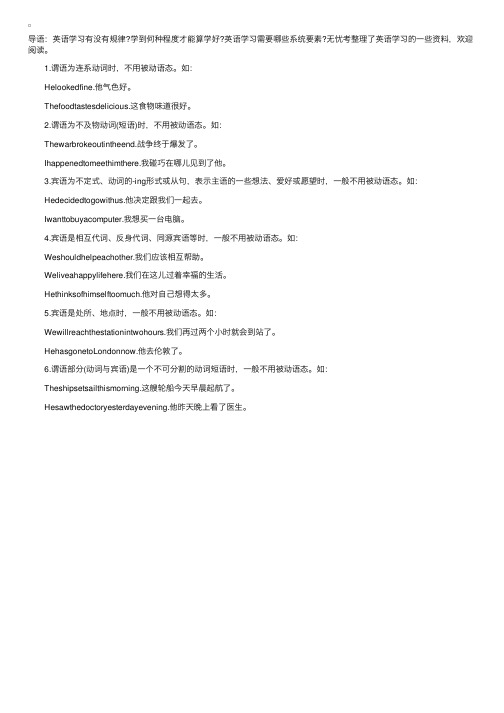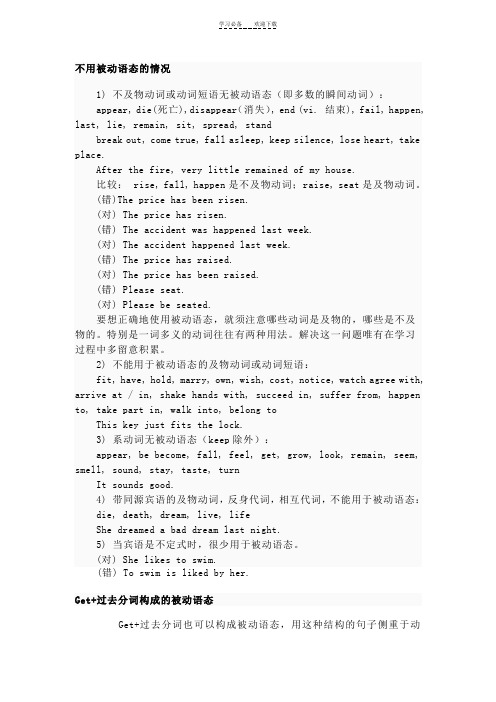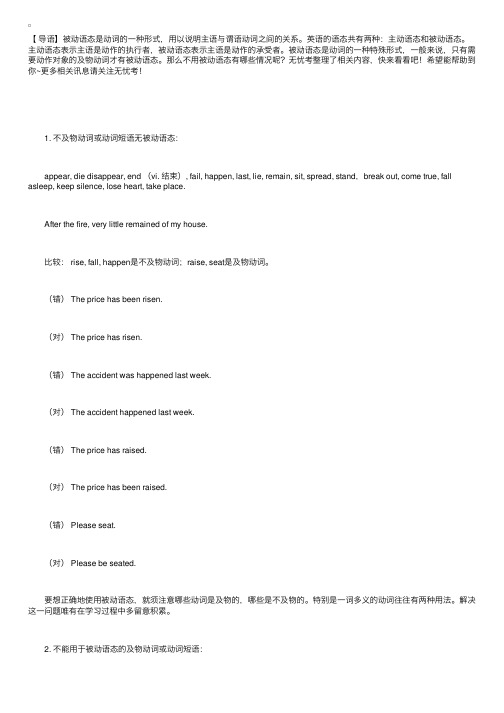不用被动语态的情况
英语不能用被动语态的情况

不能用被动语态的情况初中语法:1) 不及物动词或动词短语无被动语态:appear, die disappear, end (vi. 结束), fail, happen, last, lie, remain, sit, spread, stand break out, come true, fall asleep, keep silence, lose heart, take place.After the fire, very little remained of my house.比较:rise, fall, happen是不及物动词;raise, seat是及物动词。
(错) The price has been risen.(对) The price has risen.(错) The accident was happened last week.(对) The accident happened last week.(错) The price has raised.(对) The price has been raised.(错) Please seat.(对) Please be seated.要想正确地使用被动语态,就须注意哪些动词是及物的,哪些是不及物的。
特别是一词多义的动词往往有两种用法。
解决这一问题唯有在学习过程中多留意积累。
2) 不能用于被动语态的及物动词或动词短语:fit, have, hold, marry, own, wish, cost, notice, watch agree with, arrive at / in, shake hands with, succeed in, suffer from, happen to, take part in, walk into, belong to This key just fits the lock.Your story agrees with what had already been heard.3) 系动词无被动语态:appear, be become, fall, feel, get, grow, keep, look, remain, seem, smell, sound, stay, taste, turnIt sounds good.4) 带同源宾语的及物动词,反身代词,相互代词,不能用于被动语态:die, death, dream, live, lifeShe dreamed a bad dream last night.5) 当宾语是不定式时,很少用于被动语态。
不用被动语态的N种情况

不用被动语态的N种情况1.不及物动词不能用于被动语态。
例如:太阳冉冉升起。
当这件事情发生?2.表示状态特征的系动词,如look、sound、feel、smell、taste、appear、seem、go、prove、turn、e、fall、get、grow、keep等的主动形式表示被动意义。
例如:听起来很好。
3.表示开始、结束、运动的动词不用于被动语态。
这类动词有begin、start、finish、open、close。
end、shut、run、XXX等。
例如:课程在8点开始。
4.read、write、wash、sell、wear、lock等动词和well、easily、XXX等连用时,主动形式表示被动意义。
例如:这支笔书写流畅。
这件外套容易洗涤。
5.一部分动词用进行时表示被动意义。
这类动词有print、cook、fry、hang、build、make等。
例如:这本小说正在印刷。
晚餐正在烹饪中。
6.need、want、require、deserve等动词以物做主语时,后接动名词的主动形式表示被动意义。
我的手表需要修理。
谁说那男孩应该受到惩罚。
7.宾语是反身代词、相互代词、同源宾语时,不用被动语态。
例如:我自学英语。
我们互相帮助。
他们过着幸福的生活。
8.一部分及物动词不用于被动语态。
常见的有:fit、have、wish、cost、leave、enter、reach、suit、benefit(受益)、lack、own等。
例如:他走进房间并拿起了他的书。
我有一本书。
Some phrasal verbs cannot be used in passive voice。
such as breakout。
take place。
lose heart。
come true。
belong to。
consist of。
add up to。
agree with。
arrive at/in。
shake hands with。
不用被动语态的N种情况

不用被动语态的N种情况在英语写作中,被动语态常常被用来强调动作的接收者。
然而,在有些情况下,使用主动语态可以更加简洁和直接。
以下是几种不用被动语态的情况:1. 目的不明确或不重要的情况当目的不明确或不重要时,使用主动语态可以更加简洁。
例如:- "The room was cleaned by someone." 可以改为 "Someone cleaned the room."- "The car was parked by a stranger." 可以改为 "A stranger parked the car."2. 动作的执行者已知或可以明确指出的情况如果动作的执行者已知或可以明确指出,使用主动语态可以更加直接。
例如:- "The report was written by John." 可以改为 "John wrote the report."- "The cake was baked by my mother." 可以改为 "My mother baked the cake."3. 动作执行者不重要的情况当动作执行者并不重要时,使用主动语态可以更加简洁。
例如:- "The package was delivered yesterday." 可以改为 "The package arrived yesterday."- "The decision was made last week." 可以改为 "The decision was taken last week."4. 强调动作执行者的情况有时候,我们希望强调动作执行者,使用主动语态可以更加有效。
例如:- "The painting was created by Picasso." 可以改为 "Picasso created the painting."不过需要注意的是,有些情况下使用被动语态可以更准确地表达意思。
英语中不用被动语态的几种情况

导语:英语学习有没有规律?学到何种程度才能算学好?英语学习需要哪些系统要素?⽆忧考整理了英语学习的⼀些资料,欢迎阅读。
1.谓语为连系动词时,不⽤被动语态。
如: Helookedfine.他⽓⾊好。
Thefoodtastesdelicious.这⾷物味道很好。
2.谓语为不及物动词(短语)时,不⽤被动语态。
如: Thewarbrokeoutintheend.战争终于爆发了。
Ihappenedtomeethimthere.我碰巧在哪⼉见到了他。
3.宾语为不定式、动词的-ing形式或从句,表⽰主语的⼀些想法、爱好或愿望时,⼀般不⽤被动语态。
如: Hedecidedtogowithus.他决定跟我们⼀起去。
Iwanttobuyacomputer.我想买⼀台电脑。
4.宾语是相互代词、反⾝代词、同源宾语等时,⼀般不⽤被动语态。
如: Weshouldhelpeachother.我们应该相互帮助。
Weliveahappylifehere.我们在这⼉过着幸福的⽣活。
Hethinksofhimselftoomuch.他对⾃⼰想得太多。
5.宾语是处所、地点时,⼀般不⽤被动语态。
如: Wewillreachthestationintwohours.我们再过两个⼩时就会到站了。
HehasgonetoLondonnow.他去伦敦了。
6.谓语部分(动词与宾语)是⼀个不可分割的动词短语时,⼀般不⽤被动语态。
如: Theshipsetsailthismorning.这艘轮船今天早晨起航了。
Hesawthedoctoryesterdayevening.他昨天晚上看了医⽣。
没有被动语态的动词

没有被动语态的动词一;常见的look 看起来,sound 听起来,taste 尝起来,smell 闻起来,feel感到,go 变得,grow 变得等;二、一些不能接宾语的动词短语也没有被动语态;1.The war broke out in 1937.break out,爆发2.The story took place in a small mountain village.发生,take place三、甚至有些及物动词和可以接宾语的动词短语要看他们作什么意思讲,有时也只能有主动语态而不宜于用被动语态;1.We have six classes every day. have,上课2.The hall can hold more than 500 people. held,容纳3.The project lasted 14 years and cost I billion US st,延续4.No dish suits all tastes. suit,适合类似的还有fit ,catch ,get ,take ,own ,meet 等;四、而有些动词和短语兼有及物和不及物两种用法,所以前者有被动语态,而后者没有;1.He serves in the Navy Department. 服役,不及物2.Hamburger is served in this restaurant. 供应,及物3.The plane toke off at eight last night. 起飞,不及物类似的还有look into 作往里看,不及物;作调查、研究,及物look up 作好转,不及物;作查阅,及物等;五、而如果及物动词后的宾语是反身代词,相互代词;或者宾语前面有和主语同一人物的物主代词;或者是同源宾语的动词,也常常不能转换为被动语态;例如:1.The thief hid himself behind the door . 宾语为反身代词2.We should learn from each other. 宾语为相连代词六、带宾语从句的句子常常没有被动语态1.Marx found that his English was too limited.2.I don’t know where he lives.但是,如果主句的谓语动词是believe ,say ,know ,report 等,且宾语从句是由that ,whether引起的,则常可以用It is believed say ,know ,report that whether 的句型;七、有些及物动词有其习惯性用法,常用主动代替被动:1.It is a pretty material ,but it doesn’t wash.比较:My shirt is usually washed by myself.2. The new Ford is selling badly.比较:All newspapers have been sold out.类似的还有clean ,lock ,write ,play ,start ,cut等;八、最后要说的是另一种情况:英语中有不少动词及动词短语常用被动形式来表示主动的含义;1.Be seated, please2.We must be prepared for the worst.类似的还有be determined to ,be absorbed in , be gone , be married to , behi dden , be interested in ……and advanced mathematics ,experienced school , learned man 等中这些定语用的过去分词也是用过去分词表主动;I dreamed a good dream.我做了一个好梦一般不会说A good dream was dreamed.AS的基本用法as ... as用于比较句型,中间插入的是形容词或副词的原级;意思是"达到与什么相同的程度";如:He is as strong as a horse. 他力大如牛;二、习惯用法1. as soon as意思是"一......就......",引导一个时间状语从句;如:I'll call you as soon as I finish my homework. 我一完成我的作业,就给你打电话;2. as long as意思是"长达......之久;只要......";如:She has searched the information about dinosaurs on the Internet as long as three hours. 她在因特网上搜索有关恐龙的信息已经长达三个小时;3. as much as意思是"高达......;与......一样多";是用来表达极其多的语气;如:Some of the stones weigh as much as fifteen tons.有些石头重达15吨;★as...as用法:as...as意为"和……一样",表示同级的比较;使用时要注意第一个as为副词,第二个as为连词;其基本结构为:as+ adj./ adv. +as;例如:1This film is as interesting as that one.这部电影和那部电影一样有趣;其否定式为not as/so +adj./ adv. +as;例如:This dictionary is not as/so useful as you think.这本字典不如你想象的那样有用; 若有修饰成分,如twice, three times, half, a quarter等,则须置于第一个as之前;例如:Your bag is twice as expensive as mine.你的袋子比我的贵一倍;几个关于as...as的常见句型:1as...as possiblePlease answer my question as soon as possible.请尽快回答我的问题;2as...as usual/beforeShe looks as pretty as before.她看起来和以前一样漂亮;3as long as... 引导条件状语从句It took us as long as three years to carry out the plan.我们花了长达三年的时间才完成这项计划;4as far asHe walked as far as the railway station yesterday evening.昨天傍晚,他一直散步到火车站;5as well asShe cooks as well as her mother does.她烧菜烧得跟她母亲一样好;★as...as的结构:as + 形容词或副词原级 + as1在否定句或疑问句中可用so… as;He cannot run so/as fast as you.2当as… as 中间有名词时采用以下格式;as +形容词+ a +单数名词as + many/much +名词This is as good an example as the other is.I can carry as much paper as you can..3用表示倍数的词或其他程度副词做修饰语时,放在as的前面;This room is twice as big as that one.Your room is the same size as mine.4 倍数+ as + adj. + as <=> 倍数+ then + ofThis bridge is three times as long as that one.This bridge is three times the length of that one.Your room is twice as large as mine.Your room is twice the size of mine.。
被动语态

不用被动语态的几种情况1.不及物动词不能用于被动语态。
➢The sun is rising.➢When did the thing occur?2.系动词(look、sound、feel、smell、taste、appear、seem、go、prove、turn、become、fall、get、keep)不能用于被动语态。
➢It sounds very good.3.表示开始、结束、运动的动词(begin、start、finish、open、close、stop、end、shut、run、move)不用于被动语态。
➢Class begins at eight o’clock.4.read、write、wash、smell、wear、lock等动词与well、easily、smoothly等连用时,主动形式表被动意义.➢The pen writes smoothly.➢The coat washes easily.5.一部分动词(print fry hang build make)用进行时,就可以表示被动意义。
➢The novel is painting.➢The supper is cooking6.这些动词(need want require deserve),以物做主语时,后面接的动名词的主动形式表被动意义。
➢My watch needs/wants/requires repairing.➢Who said the boy deserves punishing?7.一部分及物动词(fit、wish、cost、leave、enter、reach、suit、benefit、lack、own)不用于被动语态。
8.一些动词短语(break out、take place、lose heart、come true、belong to、consist of、add up to、suffer from、happen to、take part in)不能用于被动语态。
初中英语语法大全:不用被动语态

初中英语语法大全:不用被动语态各位读友大家好,此文档由网络收集而来,欢迎您下载,谢谢初中英语语法大全:不用被动语态不用被动语态的情况1) 不及物动词或动词短语无被动语态:appear, die disappear, end , fail, happen, last, lie, remain, sit, spread, stand break out, come true, fall asleep, keep silence, lose heart, take place.After the fire, very little remained of my house.比较:rise, fall, happen是不及物动词;raise, seat是及物动词。
The price has been risen.The price has risen.The accident was happened last week.The accident happened last week.The price has raised.The price has been raised.Please seat.Please be seated.要想正确地使用被动语态,就须注意哪些动词是及物的,哪些是不及物的。
特别是一词多义的动词往往有两种用法。
解决这一问题唯有在学习过程中多留意积累。
2) 不能用于被动语态的及物动词或动词短语:fit, have, hold, marry, own, wish, cost, notice, watch agree with, arrive at / in, shake hands with, succeed in, suffer from, happen to, take part in, walk into, belong toThis key just fits the lock.Your story agrees with what had already been heard.3) 系动词无被动语态:appear, be become, fall, feel, get,grow, keep, look, remain, seem, smell, sound, stay, taste, turnIt sounds good.4) 带同源宾语的及物动词,反身代词,相互代词,不能用于被动语态:die, death, dream, live, lifeShe dreamed a bad dream last night.5) 当宾语是不定式时,很少用于被动语态。
不用被动语态的八大场合

◆
◆
28 不用被动语态的八大场合
— What do you think of my composition?
辨
示动作;系表结构中的过去分词相当于
析
形容词,表示状态。
I found the whole yard was covered with snow.
例
(系表结构)
句
The highway was covered by the snow and had to be closed. (被动语态)
◆
◆
28 不用被动语态的八大场合
四
to, last等不用于被动语态。
Gulf War broke out on January 17, 1991.
例
句
1991年1月17日,海湾战争爆发。
◆
◆
28 不用被动语态的八大场合
表示状态或特征的及物动词, 如contain,
场
合
hold, cost, fit, have, lack, resemble, suit
一
C. belonged to D. belongs to
案为D。
典 型 例 题 二
This kind of ice cream _____ like a
D。系动词sound , smell , feel , taste, look等后跟名
combination of banana and straw- 答 词、形容词等时, 往往用
接
为被动语态时不可去掉构成动词短语的介
词或副词。
We can’t laugh at him.
例
→He can’t be laughed at by us.
不用被动语态的五种情况

不用被动语态的五种情况一、主动语态与被动语态的区别在英语中,主动与被动语态是用来表达动作的执行者和承受者的不同关系。
主动语态强调执行动作的主体,而被动语态则强调动作的承受者。
举个例子: - 主动语态:Tom ate an apple. - 被动语态:An apple was eaten by Tom.主动语态中,动作的执行者是Tom,他是动作的主体;而被动语态中,动作的承受者是an apple,它成为动作的主语,而Tom成为介词by的宾语。
二、主动语态的使用场景主动语态在英语中是最常用的语态形式,它直接表达了动作的执行者和行为,更加简洁明了。
同时,使用主动语态还可以提高句子的流畅度和表达的准确性。
下面将探讨五种情况下主动语态的使用场景。
2.1 表达动作的执行者是重要信息在某些情况下,动作的执行者是信息的重要组成部分,使用主动语态可以直接明确表示。
例如,当我们强调主语的身份时,主动语态通常会更加合适。
例子: - The CEO announced the new company policy. - Our team won the championship.2.2 强调动作的进行方法主动语态可以更加清晰、直接地描述动作的进行方法,表述起来更加生动活泼。
在这种情况下,使用主动语态可以更好地突出这一点。
例子: - She painted a beautiful picture. - The chef cooked the meal with great skill.2.3 描述习惯性行为或普遍真理当我们需要表达习惯性行为或普遍真理时,主动语态是更为常见的选择。
被动语态在这种情况下显得多余且不必要。
例子: - People need food and water to survive. - Birds build nests to lay eggs.2.4 表述感受、兴趣和态度主动语态可以更好地表达人们的感受、兴趣和态度。
英语中不能用于被动语态的动词都有哪些

英语中不能用于被动语态的动词都有哪些?希望高手总结一下,最好每个带一个例句。
最佳答案你就记住一些动词应用中只能用主动表示被动。
1、Need, want, require(要求,需要), deserve(应得,值得), be worth值得),not bear(经不住) 后面接doing主动表被动。
The book is worth reading. 这本书值得一读。
The old building requires repairing. 这座古建筑需要修了。
These young seedlings will require/need looking after (=need to be looked after) carefully. 这些幼苗将需要小心的照管。
Your hair wants/needs cutting (needs to be cut). 你的头发该剪了。
2、不定式作定语,放在被修饰词后面,与前面被修饰的名词或代词有动宾关系,又在句子中与另一名词或代词有主谓关系,不定式要用主动表被动含义。
I have much work to do. 我有许多要做的事情。
(与work有动宾关系,与I有主谓关系)Tom is looking for a room to live in. Tom在找一间住的房间。
(与room有动宾关系,与Tom 有主谓关系)He has a family to support. 他要维持一个家庭。
(与family有动宾关系,与he有主谓关系)3、不定式修饰作表语和宾语补足语的形容词时,结构:主语+系动词+形容词+ 不定式;动词+宾语+形容词+不定式。
如果形容词是表示难易、利弊等含义,如difficult, easy, comfortable(舒适的), convenient(便利的,方便的), hard, cheap, expensive, 等,不定式用主动表被动。
不能用于被动语态的整理总结

不能用于被动语态的总结1、there be 结构及所有的不及物动词或动词短语充当谓语时,无被动语态。
There are twelve months in a year.The war broke out in 1937.(break out, 爆发 )The story took place in a small mountain village. (take place,发生 )常见的不及物动词或动词短语有:appear, die, happen, lie(躺;位于 ), remain, occur, come true, break out, take place 等。
2、表示“状态”的谓语动词,如:last, hold, keep, suit, remain, look like, consist of 等不能用被动语态。
The hall can hold more than 500 people. (hold,容纳 )The project lasted 14 years and cost 1 billion US dollars. (last,延续 )No dish suits all tastes. (suit,适合 )The committee consists of ten members委.员会由十人组成。
3、表示“归属”的动词,如have,own ,belong to 等。
We have three meals a day我.们一日吃三餐。
We have six classes every day. (have,上课 )Our success belongs to all the people.我们的成功属于每一个人。
(belong to, 属于 ) 4、表示“希望、意图”的动词,如wish,want ,hope,like,love, hate 等。
But I hate autumn and winter。
被动语态应用条件

不用被动语态的情况1) 不及物动词或动词短语无被动语态(即多数的瞬间动词):appear, die(死亡),disappear(消失), end (vi. 结束), fail, happen, last, lie, remain, sit, spread, standbreak out, come true, fall asleep, keep silence, lose heart, take place.After the fire, very little remained of my house.比较: rise, fall, happen是不及物动词;raise, seat是及物动词。
(错)The price has been risen.(对) The price has risen.(错) The accident was happened last week.(对) The accident happened last week.(错) The price has raised.(对) The price has been raised.(错) Please seat.(对) Please be seated.要想正确地使用被动语态,就须注意哪些动词是及物的,哪些是不及物的。
特别是一词多义的动词往往有两种用法。
解决这一问题唯有在学习过程中多留意积累。
2) 不能用于被动语态的及物动词或动词短语:fit, have, hold, marry, own, wish, cost, notice, watch agree with, arrive at / in, shake hands with, succeed in, suffer from, happen to, take part in, walk into, belong toThis key just fits the lock.3) 系动词无被动语态(keep除外):appear, be become, fall, feel, get, grow, look, remain, seem, smell, sound, stay, taste, turnIt sounds good.4) 带同源宾语的及物动词,反身代词,相互代词,不能用于被动语态:die, death, dream, live, lifeShe dreamed a bad dream last night.5) 当宾语是不定式时,很少用于被动语态。
英语语法:不用被动语态的情况

【导语】被动语态是动词的⼀种形式,⽤以说明主语与谓语动词之间的关系。
英语的语态共有两种:主动语态和被动语态。
主动语态表⽰主语是动作的执⾏者,被动语态表⽰主语是动作的承受者。
被动语态是动词的⼀种特殊形式,⼀般来说,只有需要动作对象的及物动词才有被动语态。
那么不⽤被动语态有哪些情况呢?⽆忧考整理了相关内容,快来看看吧!希望能帮助到你~更多相关讯息请关注⽆忧考! 1. 不及物动词或动词短语⽆被动语态: appear, die disappear, end (vi. 结束), fail, happen, last, lie, remain, sit, spread, stand,break out, come true, fall asleep, keep silence, lose heart, take place. After the fire, very little remained of my house. ⽐较: rise, fall, happen是不及物动词;raise, seat是及物动词。
(错) The price has been risen. (对) The price has risen. (错) The accident was happened last week. (对) The accident happened last week. (错) The price has raised. (对) The price has been raised. (错) Please seat. (对) Please be seated. 要想正确地使⽤被动语态,就须注意哪些动词是及物的,哪些是不及物的。
特别是⼀词多义的动词往往有两种⽤法。
解决这⼀问题唯有在学习过程中多留意积累。
2. 不能⽤于被动语态的及物动词或动词短语: fit, have, hold, marry, own, wish, cost, notice, watch agree with, arrive at / in, shake hands with, succeed in, suffer from, happen to, take part in, walk into, belong to This key just fits the lock. Your story agrees with what had already been heard. 3. 系动词⽆被动语态: appear, be become, fall, feel, get, grow, keep, look, remain, seem, smell, sound, stay, taste, turn It sounds good. 4.带同源宾语的及物动词,反⾝代词,相互代词,不能⽤于被动语态: die, death, dream, live, life She dreamed a bad dream last night. 5. 当宾语是不定式时,很少⽤于被动语态。
用法02 无被动语态的情况(解析版)---备战高考英语二轮复习之英语语态“知识条目”高效练

备战2021年高考英语二轮复习之英语语态“知识条目”高效练结构2 无被动语态的情况【要点回顾】1、一般以为凡及物动词都有相应的被动句,其实不然,当“主动宾”结构的谓语动词是表示状态或特征的及物动词,如contain,cost,fit,have,lack,resemble,suit等,主动句便没有相应的被动句:Linda resembles her mother.琳达象她母亲。
This red coat becomes her.这件红上衣合她的身。
The auditorium holds 2000 people.大礼堂能容纳两千人。
My shoes don't fit me.我的鞋不合脚。
Jack always lacks confidence.杰克总是缺乏信心。
但是,状态动词know有相应的被动态:Experts have been known to make this mistake.大家知道,专家也会犯这种错误。
有时,有些不能用于被动语态的状态动词,在同一意义上,如果不用by-词组,可以有被动句。
如:All my things are held in this box.这只箱子里装着我所有的东西。
2、某些被动句没有相应的主动句。
例如:She was born in Nanjing.她生于南京。
He was said to be an honest man.据说他是个老实人。
They will be married next month.他们将于下月结婚。
Mary said that she was not obliged to work overtime.玛丽说她并不是非加班不可。
3、当“主动宾”结构的宾语为反身代词或相互代词时,通常不能转换为被动句。
例如:The doctor dedicated herself to finding a cure.这位医生为寻求一种治疗方法奉献了她的一生。
英语不能用被动语态的若干情况

英语不能用被动语态的若干情况■不及物动词没有被动语态,如rise, happen, succeed, remain, lie, disappear, last等。
如:After the fire, nothing remained.那场大火之后,什么也没留下来了。
误:After the fire, nothing was remained.■不及物动词短语没有被动语态,如:take place, break out, belong to等。
如:Great changes have taken place here since 1990.自1990年以来这里发生了巨大的变化.误:Great changes have been taken place here since 1990.■有的及物动词也没有被动语态,如cost, leave, enter, reach, suit, have, wish,hold, own, lack, fit, resemble, jump, mind等。
如:She entered the room just now.他刚才进过房间。
误:The room was entered by her just now.Tom jumped the queue.汤姆插队。
误:The queue was jumped by Tom.■有些及物的短语动词也没有被动语态,如agree with, arrive at/in, shake handswith, succeed in, suffer from, happen to, walk into, belong to等。
如:I don’t agree with him.我不同意他的看法。
误:He isn’t agreed with by me. ()■宾语是反身代词、相互代词、同源宾语、不定式、v-ing形式及抽象名词等,都不能变为被动句子的主语,如:I taught myself French.我自学法语。
【高中英语语法 语态】不用被动语态的情况英语听力

【高中英语语法语态】不用被动语态的情况I. 无被动语态的动词:除不及物动词无被动语态外,有另外六类动词无被动语态:1.某些表示静态的及物动词:have,fit,lack,resemble(像),suit,hold(容纳),cost,suffer,last(持续)等。
He has a good car.(不说:A good car is had…)他有一辆好汽车。
They were having a bath then.(不说:A bath was being had…)那时他们正在洗澡。
The shoes don't fit me.(不说:I'm not fitted by…)这双鞋不合适我。
He resembles his father.(不说:His father is resembled by…)他长得像他父亲。
The shirt suits me well.(不说:I'm suited by…)这衬衫很合我身。
The room can hold 500 people.(不说:500 people can be held by…)这房间能容纳500个人。
The book cost me five dollars.(不说:I was cost five dollars by…)这本书花了我5美元。
They suffered heavy losses.(不说:They were suffered…)他们损失惨重。
2.某些由及物动词转变的自动词:这些动词有人称之为主动形式,被动意义,也有人称之为自动词。
顾名思义,自动词是说动词的动作是由主语自身所产生的。
既然是主语自身产生的动作,就根本不存在被动语态了。
这类动词常见的有:promise(有指望),sell,wash,write,wear,read,break out,run out,give out,add up to,take place,turn out(证实),catch(挂住),等。
中考英语考点之不用被动语态情况(完整版)

中考英语考点之 不用被动语态情况不能使用被动语态的情况被动语态的特殊情况:1. 不能用被动语态的几种情况:(1)所有的不及物动词或不及物动词词组不能用于被动语态。
(2)表示状态的谓语动词,如:last、hold、benefit、contain、equal、fit等。
(3)表示归属的动词,如have、own、belong to等。
(4)表示"希望、意图"的动词,如:wish、want、hope、like、love、hate等。
(5)宾语是反身代词或相互代词时谓语动词用主动语态,不能用被动语态。
2. 主动形式表被动意义的情况:(1)系动词没有被动形式,但有些表示感受、感官的连系动词feel,sound,taste,book,feel等在主系表结构中常以主动形式表示被动意义。
(2)当cut,sell,read,write,fill,cook,lock,wash,drive,keep等词带状语修饰语时。
(3)当break out、take place、shut off、turn off、work out等动词词组表示"发生、关闭、制定"等意思时。
(4)want,require,need后面的动名词用主动表示被动含义。
(5)be worth doing用主动形式表示被动含义。
(6)在"be + 形容词+ to do"中,不定式的逻辑宾语是句子的主语,用主动代被动。
另外:be to blame(受谴责),be to rent(出租)也用主动形式表被动。
学科&网1. As time went on, Einstein’s theory __________ to be correct.A. provedB. provesC. is provedD. was proved2. The retired worker likes getting up early. The air in the morning is good__________.A.to be breathedB. to breatheC. breathingD. being breathed3. I find the problems are easy __________.A. to be worked outB. to work them outC. to work outD. to be worked them out.4. Later Mrs Smith decided to buy that kind of cloth because she _________ that the cloth_________very well.A. has been told; washesB. had been told; washedC. was told; was washedD. had been told; was washed5. If so many raw materials_________ every day, they_________ in the future.A. run out; will be used upB. run out; will be run outC. are run out; will be using upD. are run out; will run out of6. His computer, which cost him a sum of money several weeks ago, is out of order and wants _________, though it looks very new.A.to repairB.to be repairingC. repairingD. repaired7. —How about watching a film on Sunday?—I can’t go to watch a film with a lot of homework _________.A. to be doneB. to doC. doingD. done1. (2018 • 江苏宿迁中考)This kind of pen __________, and is also very cheap. I think you can buy some.A. writes wellB. writes goodC. is written wellD. is written good2. (2016 • 江西)The water __________ dark and dirty. It’s no longer safe to drink.A. becameB. has becomeC. will becomeD. was becoming3. (2017 • 安徽)I am surprised at the new look of my hometown, for it __________ a lot over the years.A. changedB. changesC. will changeD. has changed4.(2017 • 山东泰安)With the development of science and technology, robot cooks __________in our families in the future.A. appearB. appearedC. will appearD. is appearing5. (2017 • 湖北省随州市中考)—What __________ if they __________ to the meeting late?—Sorry, I don’t know.A. will happen; goB. happened; goC. happens; will goD. will happen; will go6. (2017 • 江苏省宿迁市中考)My grandparents __________ for over 60 years and they loveeach other very much.A. have been marriedB. got marriedC. were marriedD. have got married7.(2016 • 湖南邵阳)We __________ for a picnic if it __________ rain this Sunday.A. will go; doesn’tB. will go; won’tC. go; doesn’t8. (2016 • 江苏镇江)—Have you been to Suning Plaza(苏宁购物中心) in our city?—No. Although it __________ for more than a week, I’m far too busy to go there.A. has startedB. has been onC. has been openD. has opened9. (2016 • 山东青岛)William Shakespeare __________ for 400 years, but his works still have greatinfluence today.A. diedB. was dyingC. has diedD. has been dead1. —What’s the meaning of the activity "Let’s Save"?—Paper shouldn’t ____________ in everyday life.A. wasteB. wastedC. be wastedD. is wasted2. The Dongying-Hainan airline ____________ for about 5 months. I have taken the flights three times.A. is openB. has openedC. has been openD. has been opened3. My house ____________ when you visited Beijing last time, so I didn’t invite you to my home.A. was being decoratedB. is being decoratedC. has been decoratedD. was decorated4. My e-mail ____________ to you last night. Have you received it ____________?A. sent;yetB. is sent;alreadyC. was sent;yet5. In the past few years, thousands of films ____________ all over the world.A. have producedB. have been producedC. are producingD. are being produced6. —It’s difficult for the village children to cross the river for school.—I think a bridge ____________ over the river.A. should be builtB. is being builtC. has been builtD. was built7. The World Expo(世博会)____________ in Shanghai now.A. being hadB. is havingC. is holdingD. is being held8. Now it’s much easier to shop online when your order is ready, the things you want to buy____________to you soon.A. sendB. were sentC. are sendingD. will be sent【跟踪训练】1. A【解析】句意:随着时间的推移,爱因斯坦的理论证明是正确的。
不用或不能用被动语态的情况

不用或不能用被动语态的情况1. 不及物动词(vi.)没有承受着,所以是不可能用于被动语态的。
如:1)He went home.2)Mr. Li began to speak. The teachers and the students listened carefully.当然,不及物动词(vi.)后面跟上介词时相当于及物动词(vt.),就可以用于被动语态了。
如:Mr. Li began to speak. The teachers and the students listened to him carefully.→Mr. Li began to speak. He was listened to carefully by the teachers and thestudents.2. 有些表示状态的及物动词(vt.)(往往是不能用于进行时的vt.)如have、let、cost、hold(容纳,盛下)等,不表示动作,不可用于被动语态。
如:1)I have some new books. √→Some books are had by me. ×2)The bus holds fifty people. √这个汽车能坐50人。
→Fifty people were held by the bus. ×3. 当及物动词(vt.)所带的宾语是表示地点、处所(有时包括组织、团体)等时,一般不能改为被动语态。
如:1)He left Beijing. √→Beijing was left by him. ×2)He entered(走进)the classroom. √→The classroom was entered by him. ×3)He joined the English club last week. √→The English club was joined by him last week. ×说明:一般地说,判断一个主动句能否转换为被动句,主要看其宾语是否真的受到动作的影响,是否真的“被触及”了。
- 1、下载文档前请自行甄别文档内容的完整性,平台不提供额外的编辑、内容补充、找答案等附加服务。
- 2、"仅部分预览"的文档,不可在线预览部分如存在完整性等问题,可反馈申请退款(可完整预览的文档不适用该条件!)。
- 3、如文档侵犯您的权益,请联系客服反馈,我们会尽快为您处理(人工客服工作时间:9:00-18:30)。
不用被动语态的情况
1) 不及物动词或动词短语无被动语态:
appear, die disappear, end (vi. 结束), fail, happen, last, lie, remain, sit, spread, stand
break out, come true, fall asleep, keep silence, lose heart, take place.
After the fire, very little remained of my house.
比较: rise, fall, happen是不及物动词;raise, seat是及物动词。
(错) The price has been risen.
(对) The price has risen.
(错) The accident was happened last week.
(对) The accident happened last week.
(错) The price has raised.
(对) The price has been raised.
(错) Please seat.
(对) Please be seated.
要想正确地使用被动语态,就须注意哪些动词是及物的,哪些是不及物的。
特别是一词多义的动词往往有两种用法。
解决这一问题唯有在学习过程中多留意积累。
2) 不能用于被动语态的及物动词或动词短语:
fit, have, hold, marry, own, wish, cost, notice, watch agree with, arrive at / in, shake hands with, succeed in, suffer from, happen to, take part in, walk into, belong to
This key just fits the lock.
Your story agrees with what had already been heard.
3) 系动词无被动语态:
appear, be become, fall, feel, get, grow, keep, look, remain, seem, smell, sound, stay, taste, turn
It sounds good.
4) 带同源宾语的及物动词,反身代词,相互代词,不能用于被动语态:
die, death, dream, live, life
She dreamed a bad dream last night.
5) 当宾语是不定式时,很少用于被动语态。
(对) She likes to swim.
(错) To swim is liked by her.。
